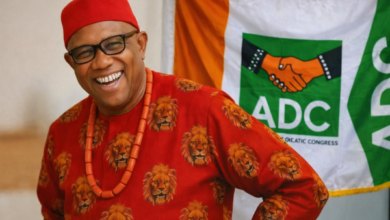POLITICS
Again, Anyaoku urges Tinubu to act on calls for new constitution

Chief Emeka Anyaoku, has urged President Bola Tinubu to urgently listen to calls for a new people-oriented constitution and set modalities in place to achieve it.
Anyaoku, a former Secretary-General of Commonwealth, gave the advice in an interview with the News Agency of Nigeria (NAN) in Lagos on Sunday.
BRANDPOWER reports that The Patriots,a nonpartisan group of leaders of thought in Nigeria, had earlier called for the convening of a national constituent assembly to help draft a new constitution for the country.
The group, led by Anyaoku, had urged Tinubu to immediately send an executive bill to the National Assembly to that effect.
Tinubu had assured the group that their request would be looked into as soon as he was done with economic reforms.
Anyaoku told NAN that a new people’s constitution was necessary owing to glaring imperfections in the 1999 Constitution .
“The 1999 constitution even as amended lacks the legitimacy that can only be conferred on a constitution democratically made by the people of Nigeria.
“We must ,therefore, have a new legitimate constitution that will give us a different governance system that can tackle more effectively the myriad challenges currently threatening the integrity of our country.
“In my view, the new constitution should be made by a constituent assembly of persons to be democratically elected on non political party basis of three each from the existing 36 States and one from the FCT.”he said.
The elder statesman said deliberations on the new constitution should take into consideration the 1960 and 1963 constitutions as well as the recommendations of the 2014 national conference.
He said the draft constitution emanating from the constituent assembly should be subjected to a national referendum for approval.
The elder statesman said ,this way, the document would have the legitimacy to qualify it as a citizens’ constitution.
Anyaokwu said a new people’s constitution will be the first to democratically made, suited for the needs of a pluralistic country.
“First, our country, Nigeria is a pluralistic country; a country of groups of people with diverse cultures, languages and religions who had lived in their separate geographical areas for generations.
“This was before their man-made amalgamation into one political entity called Nigeria. The country from its inception has, therefore, faced the challenge of how to manage its diversity.
“The second incontestable fact is that, as of today ,the Nigerian project under its present constitution is clearly not working.
“Nigerians are today assailed by “high cost of living, crude oil theft, food inflation, insecurity, corruption, divestments by multinational oil corporations.
“Others are the the flight of capital to other countries, the unabating spread of a culture of hate in the country, poor governance and bad politics
“The high hopes for the future that prevailed among the citizens, especially the youth, in the immediate years after independence are no longer there.
“In those years Nigerians travelled abroad mainly in search of education and improvement of skills.
“But now many Nigerian youths and professionals seek opportunities to go abroad to pursue self fulfilment. The increasingly popular word “Japa” did not exist in those days.
“I dare say that unless a bold and courageous remedial action is taken now to give the country a new constitution, the Nigerian project will continue to totter towards an eventual collapse,” he said.
Anyaoku said like Nigeria, there were other countries that had faced the challenge of how to manage their diversity.
The elder statesman noted that some of such countries which failed to address their diversity had disintegrated.
Anyaoku recalled how Yugoslavia broke into eight independent states after over 100 years of existence as one country and how Czechoslovakia separated into two countries after existing for 100 years as one country.
He added that Sudan,nearer home, broke into two independent countries after existing for about 3,000 years as one country.
Anyaoku, however said other pluralistic countries which consciously addressed their diversity had succeeded in remaining individual united countries.
He said examples were Switzerland, with its unique constitution, Canada and India with their truly federal constitutions.












